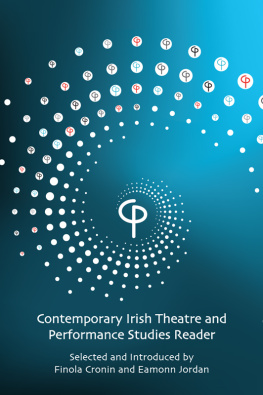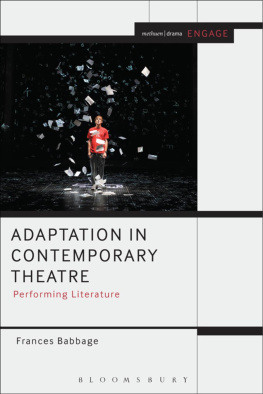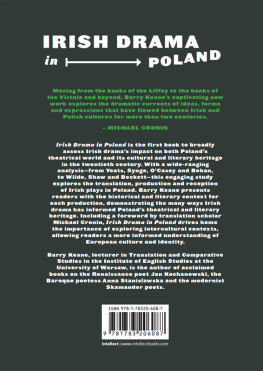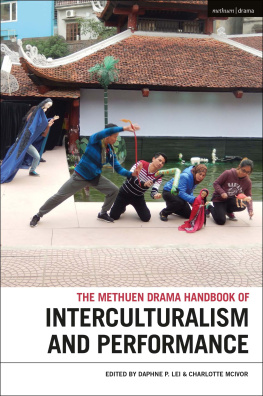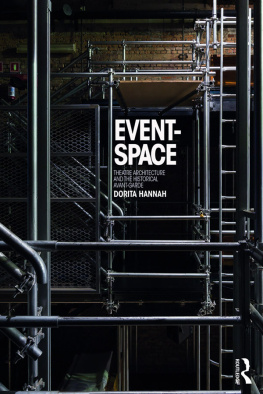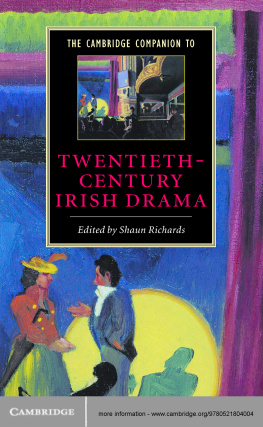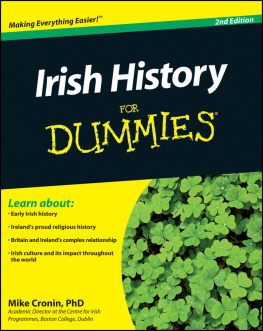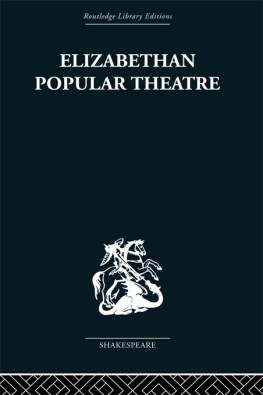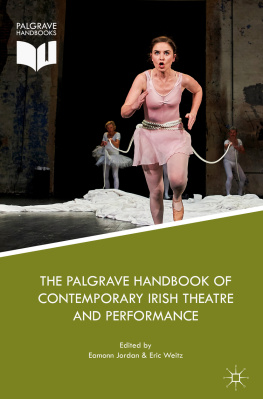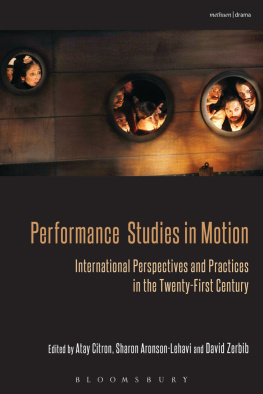Cronin Finola - Contemporary Irish Theatre and Performance Studies Reader
Here you can read online Cronin Finola - Contemporary Irish Theatre and Performance Studies Reader full text of the book (entire story) in english for free. Download pdf and epub, get meaning, cover and reviews about this ebook. publisher: Carysfort Press Limited, genre: Politics. Description of the work, (preface) as well as reviews are available. Best literature library LitArk.com created for fans of good reading and offers a wide selection of genres:
Romance novel
Science fiction
Adventure
Detective
Science
History
Home and family
Prose
Art
Politics
Computer
Non-fiction
Religion
Business
Children
Humor
Choose a favorite category and find really read worthwhile books. Enjoy immersion in the world of imagination, feel the emotions of the characters or learn something new for yourself, make an fascinating discovery.
- Book:Contemporary Irish Theatre and Performance Studies Reader
- Author:
- Publisher:Carysfort Press Limited
- Genre:
- Rating:5 / 5
- Favourites:Add to favourites
- Your mark:
- 100
- 1
- 2
- 3
- 4
- 5
Contemporary Irish Theatre and Performance Studies Reader: summary, description and annotation
We offer to read an annotation, description, summary or preface (depends on what the author of the book "Contemporary Irish Theatre and Performance Studies Reader" wrote himself). If you haven't found the necessary information about the book — write in the comments, we will try to find it.
Cronin Finola: author's other books
Who wrote Contemporary Irish Theatre and Performance Studies Reader? Find out the surname, the name of the author of the book and a list of all author's works by series.
Contemporary Irish Theatre and Performance Studies Reader — read online for free the complete book (whole text) full work
Below is the text of the book, divided by pages. System saving the place of the last page read, allows you to conveniently read the book "Contemporary Irish Theatre and Performance Studies Reader" online for free, without having to search again every time where you left off. Put a bookmark, and you can go to the page where you finished reading at any time.
Font size:
Interval:
Bookmark:
CONTEMPORARY IRISH THEATRE AND PERFORMANCE STUDIES READER
Selected and introduced
by Finola Cronin and Eamonn Jordan
A Carysfort Press eBook
Contemporary Irish Theatre and Performance Studies Reader
Selected and introduced by Finola Cronin and Eamonn Jordan
First published in Ireland in 2016 as an ebook original by
Carysfort Press, 58 Woodfield, Scholarstown Road Dublin 16, Ireland
Parent ISBN: 978-1-909325-94-4
2016 Copyright remains with the authors
Typeset by Carysfort Press
Cover design by eprint
This book is published with the financial assistance of The Arts Council
(An Comhairle Ealaon), Dublin, Ireland
Caution: All rights reserved. No part of this ebook may be printed or reproduced or utilized in any form or by any electronic, mechanical, or other means, now known or hereafter invented including photocopying and recording, or in any information storage or retrieval system without permission in writing from the publishers.
This ebook is sold subject to the conditions that it shall not, by way of trade or otherwise, be lent, resold, hired out, or otherwise circulated in any form of binding or cover other than that in which it is published and without a similar condition, including this condition, being imposed on the subsequent purchaser.
NOTE
Drawing together over seventy outstanding essays from Carysfort Presss various publications on Irish Theatre, this e-publication outlines the reach and complexity of Irish theatre and provides particular understanding of the work of many internationally renowned Irish playwrights, directors, designers and performers. The selected essays not only reflect on the texts and performance variables, but also on the various social, political, cultural contexts in which this work is made and received. There is a basic acknowledgement that Irish theatre does not just happen in Ireland; it is read and performed internationally.
List of Contributors:
Michael Barker Caven, Ben Barnes, Csilla Bertha, Richard Cave, Enrica Cerquoni, David Cregan, Finola Cronin, Jim Culleton, Sabine Dargent, Anne Devlin, Bernard Farrell, Jimmy Fay, Ger Fitzgibbon, Lisa Fitzpatrick, Olwen Four, Ben Francombe, David Grant, Nicholas Grene, Miriam Haughton, Charlotte Headrick, Kathleen A. Heininge, Shonagh Hill, Declan Hughes, Garry Hynes, Eamonn Jordan, Marie Kelly, Kevin Kerrane, Thomas Kilroy, Jason King, Mria Kurdi, Elizabeth Kuti, Jos Lanters, Cathy Leeney, Helen Lojek, Patrick Lonergan, Anna McMullan, Eugene McNulty, Conor McPherson, Hiroko Mikami, Tim Miles, Donald E. Morse, Mikel Murfi, Paul Murphy, Christopher Murray, Siobhn OGorman, Deirdre OLeary, Anne F. OReilly, Fintan OToole, Martine Pelletier, Ondej Piln, Emilie Pine, Ursula Rani Sarma, Anthony Roche, Noelia Ruiz, Melissa Sihra, Rhona Trench, Clare Wallace, Fintan Walsh, Jesse Weaver, Eric Weitz
PART ONE
Introduction
Finola Cronin and Eamonn Jordan
Origins
The origins of this Contemporary Irish Theatre and Performance Studies Reader have a number of different impulses, but most notably the fact that the editors of this e-publication believe that the time is right to select from Carysfort Presss various publications a variety of essays that would prove to be good starting points for anyone engaged in thinking, reading, and/or writing about Irish Theatre. Additionally, it might also be a resource for those responding to or making Irish work or thinking about how such work is made.
Irish Theatre has been hugely successful over the past one hundred and fifty years, and especially in the last sixty years or so, as theatre companies, directors, designers, actors and playwrights gained significant international reputations, recognition and renown. The Abbey, Gate and Project Arts Centre in Dublin, Lyric in Belfast, Waterfords Red Kettle, Corks Corcadorca, Galways Druid Theatre Company and other companies as various as Rough Magic, Pan Pan, Field Day, Irish Modern Dance Theatre Company, Fabulous Beast, Corn Exchange, Barabbas the company, and Brokentalkers have actively sought to make work that could be performed in Ireland and seen abroad. Significant volumes of work have been produced and toured and companies have embarked on co-productions with international partners. Various festivals in Ireland have brought inspiring international work to audiences. Irish writers have adapted and translated work by their international counterparts. Today, globalisation, festivalisation, new media and new technologies have differently impacted on the processes of theatre making and its reception. It is important to note that all work by Irish writers is not only first performed in Ireland. For instance, Conor McPherson invariably has his work premiered in London. In more recent times work made by non-Irish national performers and companies, such as Polish Theatre Ireland, Arambe Productions, etc., has started to become more and more influential. Mainstream and fringe festivals across the island have been hugely significant in offering opportunities to theatre makers, and for Irish practitioners to see cutting-edge work, and work of international renown. Such festivals are not the only opportunities; many practitioners travel abroad for training and to experience work.
While the predominance of text-based performances remains, more and more work evolves through devised/collective processes. There is also the increasing incidence of work appearing in non-traditional venues, or of people being more creative with traditional spaces. Of course, most recently Anu productions have been very successful with their socially aware, immersive-style, site-specific performances. Such work evades easy categorisation. As many commentators have already noted, traditional distinctions between mainstream and conventional theatre practices and the fringe or avant-garde have become more and more blurred. For instance, THISISPOPBABYs Alice in Funderland: A New Musical by Philip McMahon and Raymond Scannell, wasproduced at the Abbey in 2012 and Pan-Pans Gavin Quin directed a production of A Midsummers Night Dream on the Abbey main stage in 2015. Indeed Miss Pandora Panti Blisss Noble Call address about homophobia at the Abbey Theatre in 2014 was one of the seminal moments in the debates on marriage equality for same-sex couples. In May 2015 Ireland voted to make a constitutional change that allows for same sex marriage.
Funding of course is always a dominant aspect. Arts-funding rose considerably during the Celtic Tiger years (1993-2007), but with the age of austerity and recession from 2007 forward, many of the smaller theatre companies in Ireland went out of business having lost state funding, and of those who remain in existence most are now operating on such straightened finances that they barely survive from production to production. In particular, Arts Council project-specific funding, does not allow for the continuities that most companies need, in terms of artistic policy, administrative support structures, and audience development.
Loose Canon is a perfect example of a theatre collective, whose commitments, risk-taking and innovations are sorely missed; sometimes the work was not fully evolved, but it was almost always challenging and extraordinarily creative. Their finest performances compared favourably to the best of international work. Currently, the international successes of writers like Marina Carr, Enda Walsh and Conor McPherson and by companies like Pan Pan and Druid Theatre Company disguise in many respects structural devastation experienced by the theatre sector in the aftermath of the Celtic Tiger period.
Most recently, the Waking-the-Feminists initiatives came about in response to the Abbey Theatres Waking the Nation programme for the year of commemoration that is 2016, a programme that inappropriately marginalised women. Of the ten events planned, only three were to be directed by women, and one was written by a woman. The Waking-the-Feminists protest gained a good deal of traction over a short period of time, thanks in part to very public expressions by senior theatre people and also thanks to social media. The absence of any substantial action by the Abbey Theatres management and Board suggests that statements of apologises and recognition of blind-spots do not really amount to anything of true substance. The National Theatre does not stand alone when it comes to this sort of problematic programming. However, lest we think that this is the only occasion of such debates, such inequalities were cogently articulated by many critical voices over the past decades.
Next pageFont size:
Interval:
Bookmark:
Similar books «Contemporary Irish Theatre and Performance Studies Reader»
Look at similar books to Contemporary Irish Theatre and Performance Studies Reader. We have selected literature similar in name and meaning in the hope of providing readers with more options to find new, interesting, not yet read works.
Discussion, reviews of the book Contemporary Irish Theatre and Performance Studies Reader and just readers' own opinions. Leave your comments, write what you think about the work, its meaning or the main characters. Specify what exactly you liked and what you didn't like, and why you think so.

